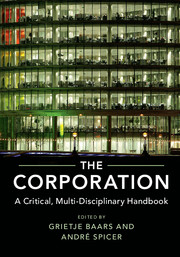Book contents
- Frontmatter
- Contents
- List of Contributors
- Acknowledgements
- Introduction: Why the Corporation?
- PART I DISCIPLINARY OVERVIEWS
- 1 The Corporation in History
- 2 The Corporation in Legal Studies
- 3 The Corporation in Economics
- 4 The Corporation in Sociology
- 5 The Corporation in Anthropology
- 6 The Corporation in Political Science
- 7 The Corporation in Geography
- 8 The Corporation in Accounting
- 9 The Corporation in Management Studies
- PART II INTERDISCIPLINARY THEMATIC CHAPTERS
- 1 The Evolution of the Corporate Form
- 2 The Multinational Corporate Group
- 3 The Financialization of the Corporation
- 4 Corporate Value Chains
- 5 Corporate Citizenship
- 6 The Corporation and Crime
- 7 The Corporation and Ideology
- 8 Corporation and Communities
- 9 Corporations and Resistance
- 10 Alternatives to the Corporation
- Index
- References
2 - The Corporation in Legal Studies
from PART I - DISCIPLINARY OVERVIEWS
Published online by Cambridge University Press: 31 March 2017
- Frontmatter
- Contents
- List of Contributors
- Acknowledgements
- Introduction: Why the Corporation?
- PART I DISCIPLINARY OVERVIEWS
- 1 The Corporation in History
- 2 The Corporation in Legal Studies
- 3 The Corporation in Economics
- 4 The Corporation in Sociology
- 5 The Corporation in Anthropology
- 6 The Corporation in Political Science
- 7 The Corporation in Geography
- 8 The Corporation in Accounting
- 9 The Corporation in Management Studies
- PART II INTERDISCIPLINARY THEMATIC CHAPTERS
- 1 The Evolution of the Corporate Form
- 2 The Multinational Corporate Group
- 3 The Financialization of the Corporation
- 4 Corporate Value Chains
- 5 Corporate Citizenship
- 6 The Corporation and Crime
- 7 The Corporation and Ideology
- 8 Corporation and Communities
- 9 Corporations and Resistance
- 10 Alternatives to the Corporation
- Index
- References
Summary
Introduction
There is a long and rich tradition of legal scholarship on the nature of the corporation, its significance for economic organization, and its wider societal impacts. The rise of the corporate form in the industrializing economies of Europe and North America generated what was, in its time, a hugely controversial, but ultimately unresolved, debate over the effects of granting legal personality to entities (Gindis, 2009; Avi-Yonah, 2011). This debate faded away in the middle decades of the twentieth century, in part because of a perception that conceptual arguments about the corporate person had little to contribute to the resolution of more pressing policy issues (Bratton, 2011). From the 1980s, corporate law scholarship enjoyed a revival, but now with economic approaches in the lead (Easterbrook and Fischel, 1991; Armour et al., 2009). Informed by agency theory, the idea of the company as a nexus of contracts took hold (Jensen and Meckling, 1976), and with it came the linked claims that companies should be run with the objective of maximizing shareholder value (Macey, 2008) and that company law should be designed accordingly (Bebchuk, 2005).
In the wake of the global financial crisis of 2008, this ‘shareholder-centric’ model of corporate governance has lost some of its sheen, while the influence of agency theory on law and policy seems to have peaked (Strine, 2008; De Graaf and Williams, 2011; Stout, 2012). However, it is not so clear what might replace agency theory or indeed if there is a single model or paradigm which is capable of unifying the field in the way that it once did. It is nevertheless possible to see the resumption of a debate which interestingly takes as its focus the ontology of the corporation and, specifically, its juridical features (Gindis, 2009; Deakin, 2011; Robé, 2011; Deakin, 2012; Lawson, 2014; Gindis, 2015), as a way into addressing wider debates about corporate power and responsibility.
From a critical perspective which seeks to unravel and challenge the assumptions which pass for conventional wisdom on the corporation, legal debates offer important insights into the origins of the shareholder value approach, its limitations, and possible alternatives to it.
- Type
- Chapter
- Information
- The CorporationA Critical, Multi-Disciplinary Handbook, pp. 47 - 63Publisher: Cambridge University PressPrint publication year: 2017
References
- 15
- Cited by



